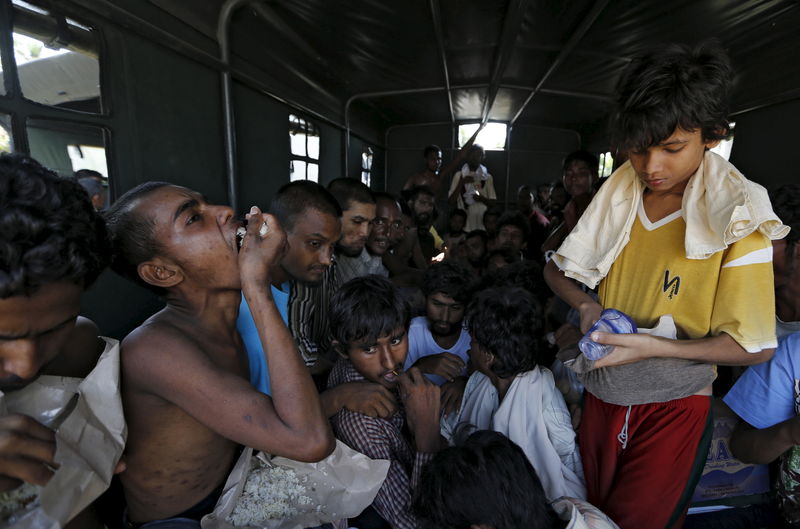By Praveen Menon
KUALA LUMPUR (Reuters) - Malaysia and Indonesia said on Wednesday they would offer shelter to 7,000 "boat people" adrift at sea in rickety boats but made clear their assistance was temporary and they would take no more.
More than 3,000 migrants have landed so far this month in Malaysia and Indonesia. Together with Thailand, they have pushed away many boats that approached their shores despite appeals from the United Nations to take them in.
In a joint statement in Kuala Lumpur, Malaysia and Indonesia emphasised that the international community also had a responsibility to help them deal with the crisis.
The migrants are mostly Rohingya Muslims from Myanmar and Bangladeshis - men, women and children who fled persecution and poverty at home or were abducted by traffickers, and now face sickness and starvation at sea.
"What we have clearly stated is that we will take in only those people in the high sea," Malaysian Foreign Minister Anifah Aman said. "But under no circumstances would we be expected to take each one of them if there is an influx of others."
Both countries said they would offer "resettlement and repatriation", a process that would be "done in a year by the international community".
The United Nations, which has been calling on governments in the region to rescue those drifting at sea, welcomed the move and urged that people be brought to shore without delay.
"We have to find ways to resettle them as soon as possible without creating a new moral hazard," Dewi Fortuna Anwar, political adviser to Indonesia's vice president, told reporters in Jakarta.
"If migrants start thinking of Indonesia as a transit point or as having a higher chance of getting resettled, that would create another problem that we have to prevent."
She said the main responsibility lay with Myanmar, which the United Nations said last week must stop discrimination against Rohingya Muslims to end a pattern of migration from the corner of the Bay of Bengal into the Andaman Sea and Malacca Strait.
"ROOT CAUSES"
The United States echoed these calls, with a senior U.S. official pointing to conditions in Rakhine state as driving Rohingyas to flee.
"Ultimately (Myanmar) must take steps to address the root causes that drove these people (to sea) and we need long term sustainable solutions, development, protection of basic human rights if we're really going to answer the problem," Deputy Secretary of State Antony Blinken told a conference in Jakarta.
Blinken is due to visit Myanmar on Thursday to discuss the unfolding crisis.
Most of Myanmar's 1.1 million Rohingya Muslims are stateless and live in apartheid-like conditions. Almost 140,000 were displaced in clashes with ethnic Rakhine Buddhists in 2012.
Myanmar terms the Rohingya "Bengalis", a name most Rohingya reject because it implies they are immigrants from neighbouring Bangladesh despite having lived in Myanmar for generations.
Myanmar's foreign ministry said in a statement published by state media on Wednesday that the government was making serious efforts to prevent people smuggling and illegal migration.

This included patrols by the navy and air force in Myanmar's territorial waters, it said.